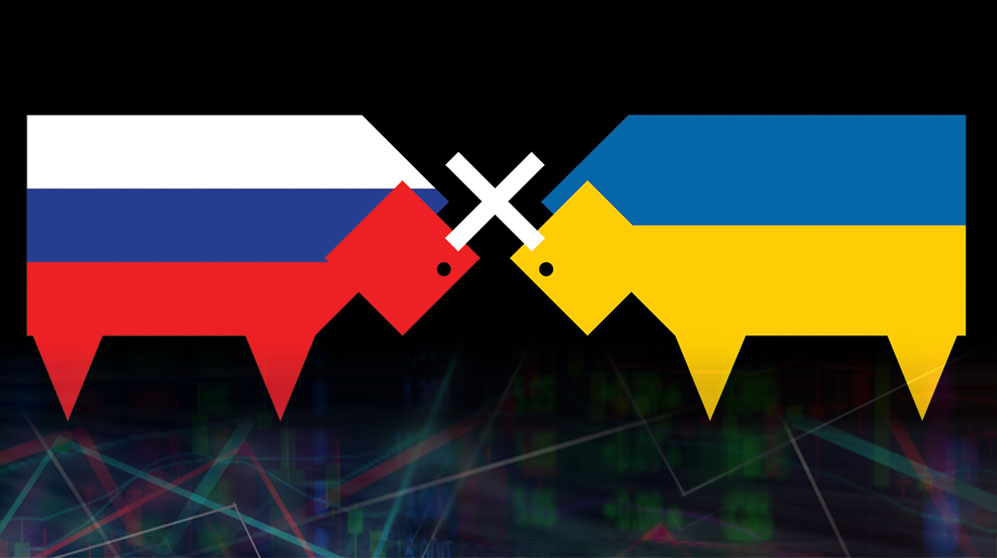Kremlin vs. Kyiv: Impact on the Global Economy Weakens
• 6 min read
- Brief: Global Economy

Get the latest in Research & Insights
Sign up to receive a weekly email summary of new articles posted to AMG Research & Insights.

LIKE A BULL IN A CHINA SHOP, IT LEAVES A MARK
Ukrainians have an old, expressive proverb: “Злісний бик турбує все стадо.” (A single vicious bull can lead a herd astray.) Over the past year, the Kremlin bull stampeded throughout Eastern Ukraine and gored innocents—including those within the bull’s own herd—all while blaming a phantasm toreador.
The resulting stampede wrought mindless bloodshed onto Europe’s breadbasket, displaced millions of citizens, shattered infrastructure, and foisted painful economic costs onto the commercially interconnected world.
The bull remains enraged, with its sight set on a single target: the Collective West. But Russia is not alone in this struggle. In calling for an end to hostilities in Ukraine, yet maintaining a close strategic partnership with Russia, China is also thinking about a future world order established on its terms.
While the tide of the war has shifted repeatedly, Ukraine remains a sovereign nation, and the West remains steadfast in its support (evidenced by President Biden’s visit to Kyiv and pledge of further military assistance).
President Putin punched back during a state of the nation address. He again blamed the West for the war and vowed to continue fighting. He also announced suspension of the New START nuclear arms control treaty, the last remaining U.S.-Russia agreement created to prevent a nuclear arms race. His announcement seems only to formalize the status quo, as Washington had already accused Russia of failing to comply with the treaty.
Unfortunately, the leadership in the Kremlin remains as fanatical as ever; a springtime respite from aggression is unlikely. The most recent round of nuclear saber-rattling from Moscow seems intended to remind the global audience of Russian potency even as such chest-pounding belies stewing dissatisfaction and, perhaps, desperation for attention and relevance.
Interdependence Has Untangled
What additional economic consequences might we see?
On the margin, the Kremlin holds minimal additional westward economic sway, though energy-hungry Europe would not mind rekindling inexpensive imports. Russia took active steps to economically unjoin after it annexed Crimea in 2014, so only a few interconnections with the Collective West remained when the invasion began on February 24, 2022.
Successive rounds of sanctions and the swift exodus of many global firms throttled the remaining arteries of economic interdependence. That is not to say the residual linkages were of little consequence: global prices of nickel doubled within two weeks and remained high through summer; prices for wheat, corn, and canola oil spiked by 25%, pushing prices of foodstuffs into critical territory for many developing nations.
Impact on the West Is Lessening but Remains Potent
The invasion led to significant global economic damage because it occurred shortly after economic slack in advanced markets had dwindled. As the military conflict’s economic fallout impacted the two most vulnerable elements of post-pandemic recovery—global supply chains and commodity prices—its ripple effects rapidly propagated into inflation expectations. Monetary policy likely tightened faster as a result.
If the Kremlin bull were to repeat its rampage this spring, it would find itself less able to impose economic costs upon its purported foes, though its trampling would not go unnoticed.
First, the brunt of the conventional economic damage has already occurred and been politically digested. Contingency plans remain fresh in corporate minds. Second, Russia’s small footprint in global commerce has further diminished over the past year. Third, the unique “window of opportunity”—when shutdown-era output gaps closed and central banks faced heightened risk of spiraling future inflation—has passed; monetary policy is entering the next chapter and inflation expectations remain anchored.
Russia’s Eastward Linkages Are a Different Story
China has historically fought more wars against Russia than against Western nations, but at present it relies on the import of Russian commodities for its own growth. This tenuous marriage of convenience is unlikely to dissolve soon. Comments by China’s top diplomat about the Russia/China relationship make it clear where China sits. Russia and China need each other for what they each don’t have. Putin has clearly made the case that it is his regime that is relevant to China, and China doesn’t want to risk regime change in Russia.
Does the Russia/China comradery have no bounds? Such an assessment seems less true now as China continues to publicly reiterate its anti-nuclear stance each time the Kremlin broaches the subject.
What Investors Should Keep In Mind
Contrary to statistics from Rosstat, a Russian official statistics service, Russia’s economy is not on the mend. Hundreds of refrigerators have been dismantled so their semiconductors could be used in a handful of military planes. Home appliances reportedly are being smuggled through the forests of Poland at night and into Russia, where they’re stripped of semiconductors and other parts also in short supply. In an effort to prop up employment statistics, the state employs former software developers to sweep streets.
Russia continues to diminish its economic importance and does not command the wherewithal to further warp the global economy by progressive escalation in Ukraine. A repeat of last spring’s “exported” inflationary spike is unlikely even if Russia digs in its heels, although Europe’s near-zero economic growth remains tethered to its eastern neighbor. As thousands of global firms have already exited the Russian market entirely, an additional hit to future earnings of global firms is difficult to imagine.
More worrisome is the Kremlin’s remaining ability to conduct some unconventional sabotage, along the lines of severing underwater fiber optics, hacking key infrastructure, or resorting to biowarfare. Economic damage from any unconventional atrocity would likely be severe but brief and limited to a market subsegment, be it foreign exchange or a particular natural resource.
The arena remains in Ukraine, but the contest is certainly more global. Russia’s axis with China improves the odds of an extended stalemate in the conflict, and efforts in Ukraine and elsewhere seem clearly intended to undermine the Collective West. Such efforts support both countries’ goal of realigning the economic world order.
RELATED ARTICLE
To read our thoughts about the war’s impact from March 2022, see Will the War in Ukraine be “Short & Contained” or “Long & Sustained”?
This information is for general information use only. It is not tailored to any specific situation, is not intended to be investment, tax, financial, legal, or other advice and should not be relied on as such. AMG’s opinions are subject to change without notice, and this report may not be updated to reflect changes in opinion. Forecasts, estimates, and certain other information contained herein are based on proprietary research and should not be considered investment advice or a recommendation to buy, sell or hold any particular security, strategy, or investment product.
Get the latest in Research & Insights
Sign up to receive a weekly email summary of new articles posted to AMG Research & Insights.


